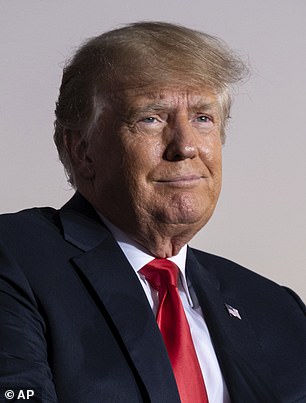Table of Contents
- US economic policy under next president will increase inflation
- But there are two reasons why UK trade can work reasonably well.
Looking to the future: Donald Trump
Let’s get away from all the politics and try to figure out what Donald Trump’s victory really means for our economy here. I take away two great messages, one about inflation and the other about trade.
Prepare for higher inflation in the United States, and that applies here too. Yes, there will be a boost to short-term growth; that’s good.
But the 2 percent inflation target is over. It will remain an aspiration, but when Federal Reserve Chairman Jerome Powell feels he has to say Donald Trump can’t fire him, as he did on Thursday, you know trouble is coming.
US economic policy under the next president will increase inflation. There will be an even larger fiscal deficit, the price to pay for the tax cuts Trump has promised. Tariffs on imported goods will increase, although perhaps not as much as billed. That drives up prices. And whoever chairs the Federal Reserve, there will be pressure for cheaper money, not only from the president but also from Congress. Easy credit means higher inflation.
So I don’t see any circumstances under which price increases can be limited to that 2 percent target.
It won’t be the double-digit horror of two years ago. It will be more like the creeping inflation we had during the 1990s and early 2000s, say around 3 percent.
This may not sound so bad, but over time it destroys wealth on a large scale. Over 25 years, 3 percent inflation cuts the value of money in half. And here we have historically had a worse inflation experience than the United States. That is why the long-term trend of the pound against the dollar is bearish, from the Bretton Woods reference value of $2.40 in 1971 to $1.30 today.
Our new government is politically opposed to the next US administration, but their impact on inflation appears remarkably similar.
They both want to borrow more money, and last week we got that warning from the Bank of England that Rachel Reeves’ Budget will take inflation to 2.8 per cent, almost half a percentage point higher than it would otherwise have been.
The Bank of England may be independent, but that hasn’t stopped prices from almost doubling since Gordon Brown gave it that mandate in 1997 when he was appointed Chancellor. Goods worth a pound then would cost £1.92 now.
Both the Federal Reserve and the Bank of England have just cut interest rates, but higher headline inflation will limit their ability to cut them much further.
And governments that want to borrow more have to pay higher rates to do so. Our ten-year yield on gilts (UK Government bonds) topped 4.5% last week, the highest this year. That’s a simple message: expect higher inflation.
The history of trade is more complicated. Trump said in his campaign that he would impose tariffs on foreign imports, with a level of 10 percent for the European Union and a level of 60 percent for China.
This may be reduced, but it would be naive not to expect some increases in import duties and perhaps other controls.
That’s important for Britain, because the United States is our biggest export market, bigger than Germany and France combined.
It would be bad for world trade and would become another marker of the gradual retreat of globalization that has been going on for almost 20 years.
However, there are two reasons why UK trade may perform reasonably well under a Trump presidency.
One is that we are not in the EU. We are not caught up in Trump’s visceral hatred of Europe. As he himself said: “They don’t take our cars, they don’t take our agricultural products, they don’t take anything.”
Well, actually the UK gets a lot from the US: around £116bn of imports in the year to June 30, 2024. That figure can rise with affable negotiation.
The other is more general. Globalization is gradually shifting from trade in goods to trade in services. The United States is the largest exporter of services, followed by the United Kingdom.
Promoting international trade in services is in our own mutual interest. That is the project we must work on together.
I hope that our Government realizes that there is a prize to be achieved and takes advantage of it.
DIY INVESTMENT PLATFORMS

AJ Bell

AJ Bell
Easy investing and ready-to-use portfolios

Hargreaves Lansdown

Hargreaves Lansdown
Free Fund Trading and Investment Ideas

interactive inverter

interactive inverter
Fixed fee investing from £4.99 per month

sax

sax
Get £200 back in trading fees

Trade 212

Trade 212
Free trading and no account commission
Affiliate links: If you purchase a This is Money product you may earn a commission. These offers are chosen by our editorial team as we think they are worth highlighting. This does not affect our editorial independence.


